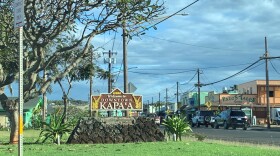More than 26 percent of the food in Hawai?i goes uneaten each year – that’s nearly one billion dollars’ worth of food likely ending up in the landfill. But Kaua?i wastes a lot less food, and thanks to a backyard effort that could prove a solution to problem of food waste statewide.
The program starts with individual residents, like Wailua Homestead's Jeremiah Felsen.

He brushes aside monstera leaves to uncover his backyard compost bin.
“All kinds of food waste in there,” said Felsen. “We’ve got some avocado, some egg shells. Now, we’re gonna add some grass.”
He says the greenery will keep the flies down and help break down the food a lot faster to produce soil.
“And then you pull it out here…See that’s more sludgy than it should look 'cause it hasn’t had enough yard waste,” says Felsen.
He said he’s had a backyard compost bin in every house he’s lived in on Kaua?i for the past 10 years. In fact, thousands of residents do.

Kaua?i County has been offering free bins to residents for nearly two decades. Allison Fraley is the county’s solid waste program coordinator.
“For the county, it’s super cost-effective because we just have a one-time purchase of the unit,” says Fraley. “Instead of putting it, you know, at the curb or us paying contractors to manage materials, it’s managed in everybody’s backyard.”
She says Kaua?i’s backyard composting program diverts about one ton of food waste a year from entering the island’s only landfill in Kekaha, which is a lot for the island’s small population.
Keola Aki, the county’s recycling programs coordinator, says at a cost to the county of about $50 per unit, the county sees a return on investment within the first year.
"Every month we distribute about 30 a month and it comes out to less than $5 per ton for processing," says Aki, "which is the most cost-effective program we have on the island right now."

Food accounts for only about 10 percent of the island’s waste stream. But a 2017 study of the island’s Kekaha Landfill found a good portion of it is compostable.
But not all food is good for composting. Kapahi resident Nikki Kunioka-Volz says there are things that she doesn?t want to put into her bin at home.
“You don't always want a compost your meat waste, dairy, any cheeses…that brings out the larger rodents and the larger pest,” says Kunioka-Volz. “So to have smaller sites that are spread out for me would be a huge, huge impact.”
She’s talking about regional transfer stations that could take food waste. Fraley says there are a few hurdles to this type of large-scale composting – one is that food waste is considered hazardous material by the state Health Department, which approves these sites.
“We hope that actually we could work with the state to reduce the barriers and maybe make a tiered system for getting a permit,” says Fraley.
More composting sites might encourage residents to think about what they throw out. And, with landfills quickly filling up, any effort to divert waste at its source helps.
Free compost bins are available to Kaua?i residents for pick-up every Friday from 8:00am to 3:30pm at the Kaua?i Resource Center, 3460 Ahukini Road, L?hu?e, Kaua?i. Residents must watch a 20-minute video on composting and check-in with the County of Kaua?i once a year.
For more information on food waste in Hawai?i, check out this primer produced by the University of Hawai?i at M?noa's College of Tropical Agriculture and Human Resources (CTAHR).
This story is part of our series, "Trashing The Islands," an examination of our waste practices statewide. We'd like to hear your comments and questions about our trash issues. Call us on our Talk Back line at (808) 792-8217 and leave your comment, name and phone number. You can also email us at news@hawaiipublicradio.org, tweet us @wearehpr or comment on our Facebook page.





